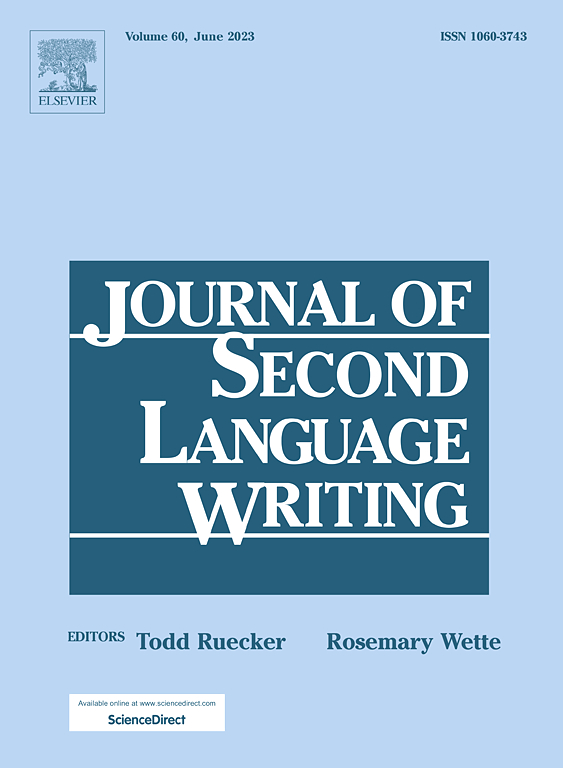课外学术阅读对二语抽象写作句法发展的影响
IF 4.5
1区 文学
Q1 LINGUISTICS
引用次数: 0
摘要
本研究旨在探讨课外学术阅读如何以及在多大程度上提高研究生抽象写作的句法复杂性。通过一个学期的AR项目,我们收集并分析了30名 英语文学专业的5年级研究生所写的研究论文摘要,并与另外30名没有参加AR项目的英语文学专业的学生进行了比较。通过使用一组大粒度和细粒度SC指数的组合,结果显示AR组的SC发育明显高于对照组。研究发现,AR学生在完成AR课程后,句子的长度增加,并且使用了更多的从属关系、复杂名词、动词短语、名义分句、状语分词的起始分句、有限关系分句和多个介词短语。相比之下,对照组仅在句子的整体长度、配合短语的使用和多词序列作为前置修饰语方面有所增长。研究结果表明,AR课程有助于AR学生的SC发展,他们对抽象体裁及其修辞结构有了更深的理解。本研究也为第二语言学术写作教学提供了新的见解和教学意义。本文章由计算机程序翻译,如有差异,请以英文原文为准。
Effects of extracurricular academic reading on syntactic development in L2 abstract writing
This study investigates how and to what extent extracurricular academic reading (AR) enhances the syntactic complexity (SC) of graduate students’ abstract writing. Through a semester-long AR programme, we collected and analysed research article abstracts written by 30 s-year graduate students majoring in English literature, compared with another 30 English literature students who did not participate in the AR programme. By using a combined set of large- and fine-grained SC indices, the results showed the AR group exhibited significantly greater development of SC than the comparison group. It was found that AR students produced longer sentences, and used more subordination, complex nominals, verb phrases, nominal clauses, initial adverbial participle clauses, finite relative clauses, and multiple prepositional phrases after AR programme. In contrast, the comparison group showed growth only in the holistic length of sentence, the usage of coordination phrases and multiple-word sequences as pre-modifiers. The findings suggest that AR programme contributes to the SC development of AR students, who gained a deeper understanding of the abstract genre and its rhetorical structure. This study also provides new insights and pedagogical implications for L2 academic writing instruction.
求助全文
通过发布文献求助,成功后即可免费获取论文全文。
去求助
来源期刊

Journal of Second Language Writing
LINGUISTICS-
CiteScore
8.80
自引率
13.10%
发文量
50
审稿时长
59 days
期刊介绍:
The Journal of Second Language Writing is devoted to publishing theoretically grounded reports of research and discussions that represent a significant contribution to current understandings of central issues in second and foreign language writing and writing instruction. Some areas of interest are personal characteristics and attitudes of L2 writers, L2 writers'' composing processes, features of L2 writers'' texts, readers'' responses to L2 writing, assessment/evaluation of L2 writing, contexts (cultural, social, political, institutional) for L2 writing, and any other topic clearly relevant to L2 writing theory, research, or instruction.
 求助内容:
求助内容: 应助结果提醒方式:
应助结果提醒方式:


